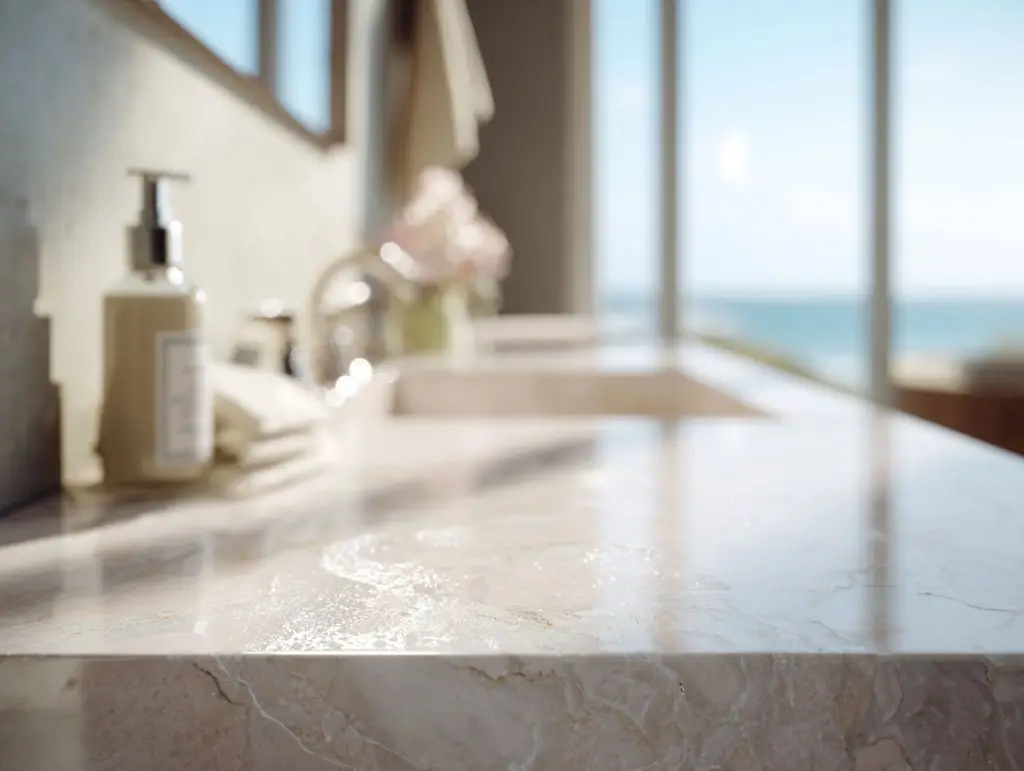
Most people associate sunscreen with protection — not with cleanup.
But if you live near the coast, your sunscreen might be quietly staining your home.
Every summer in Destin, I walk into vacation homes with spotless tile floors, beautiful counters — and a strange, dull film over everything. The owners can’t figure it out.
I can. It’s sunscreen.
A Film You Don’t See — But Always Feel
When sunscreen mixes with sweat, saltwater, and sand, it turns into a greasy residue that clings to every surface it touches.
That same invisible film ends up on glass doors, light switches, countertops, towels, and even poolside furniture.
The oils and UV filters in most sunscreens resist water — that’s how they protect your skin. But it also means they resist cleaning.
Soap alone doesn’t break them down completely. Over time, they collect dust and moisture, leaving a sticky matte finish that steals your home’s natural brightness.
The Usual Cleaning Mistake
People often make the problem worse without realizing it.
They wipe the surface with all-purpose spray — which spreads the oily residue instead of removing it.
And because the film is almost invisible, they keep repeating this routine, slowly sealing the layer in.
The result?
- Cloudy glass even after polishing.
- Countertops that feel “clean” but never shine.
- A faint, stale scent that won’t go away.
I call it “the sunscreen shadow” — and it’s everywhere after beach season.
What Actually Works
Breaking down sunscreen residue takes chemistry, not just elbow grease.
At Sharky Cleaning, we use a two-step method:
- Emulsify first. Use a degreaser or mild alkaline cleaner that can dissolve oil-based films.
- Then neutralize. Wipe with a slightly acidic solution (vinegar-based) to restore shine and remove chemical traces.
On glass and mirrors, microfiber towels make a big difference — paper towels only smear the oils.
And for fabrics or upholstery that absorbed sunscreen, an enzyme-based pre-treatment works best before washing.
What You Can Do at Home
After a beach day:
- Wipe surfaces near doors, sinks, and mirrors — these collect the most transfer.
- Rinse outdoor furniture with mild soap and warm water, not cold.
- Avoid mixing bleach and degreasers — it creates dangerous fumes.
- Once a month, clean light switches and cabinet handles — they’re often forgotten but full of buildup.
Even better, keep a designated set of “beach towels” and “indoor towels” — and never mix them in the same load.
Closing Reflection
Sunscreen is essential for your skin — but it’s rough on your home.
A little awareness and the right cleaning chemistry go a long way.
In a coastal city like Destin, protecting your home’s shine is just another form of protection — from the sea, the salt, and yes, the sunscreen.
— Andrey Zhilin, Sharky Cleaning Destin
Read also: Why Your Towels Smell Even When They’re Clean — The Hidden Role of Coastal Humidity


